FEATURES|THEMES|People and Personalities
Facing Impermanence: Palyul Center Bulgaria During the Time of Pandemic
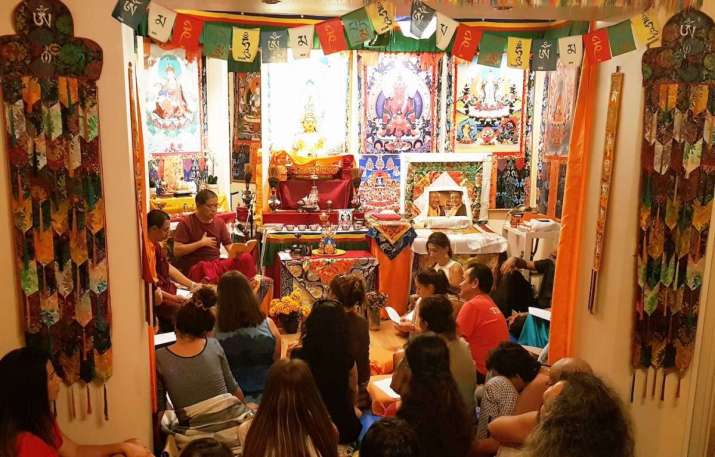 Palyul Center Bulgaria with its root teacher Pema Rinpoche. Image courtesy of Palyul Center Bulgaria
Palyul Center Bulgaria with its root teacher Pema Rinpoche. Image courtesy of Palyul Center BulgariaThis existence of ours is as transient as autumn clouds.
To watch the birth and death of beings is like looking at the movement of a dance.
A lifetime is like a flash of lightning in the sky,
Rushing by, like a torrent down a steep mountain. (Lalitavistara Sutra)
Impermanence! Facing impermanence is a matter of time: sooner or later it reveals its nature. Accepting impermanence is a matter of mental and emotional ability. Sometimes this is a hard and painful process. This past year of pandemic has been an intense and sad period, in which impermanence has revealed, every single hour and day, death, sickness, pain, worry, insecurity, and separation. In this period, we are hoping for better times to come; trying to see a light at the end of the tunnel. Such a light is the Dharma itself, the profound teachings of the Buddha. How can the light of the Dharma illuminate our path, help us to accept impermanence, and protect our minds in these challenging times? Buddhistdoor Global discussed the difficulties and the spiritual lessons of the COVID-19 pandemic for Dharma practitioners in one of the most active Buddhist centers in Bulgaria—Palyul Center Bulgaria. We spoke with Javor Konstantinov and Roman Stanoev, co-chairs of Palyul Center Bulgaria and Dharma practitioners of long experience, who take care of the center and help new members of the Bulgarian Palyul sangha.
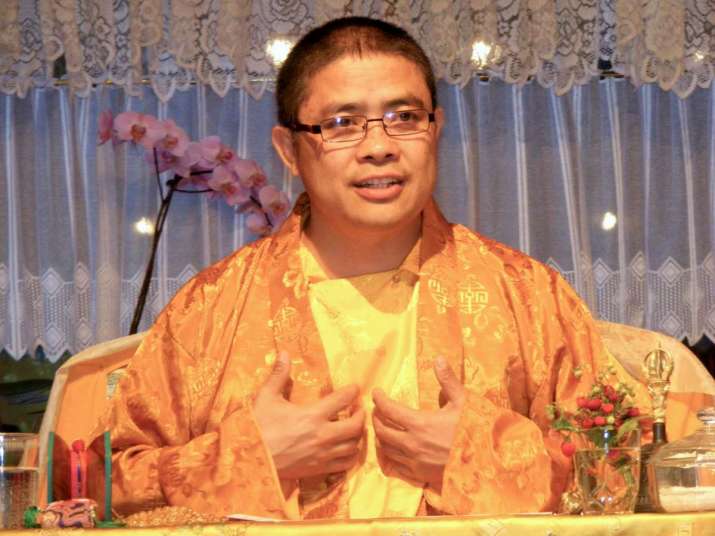 Pema Rinpoche. Image courtesy of Palyul Center Bulgaria
Pema Rinpoche. Image courtesy of Palyul Center BulgariaThe history of Palyul Center Bulgaria began in 2002, when Pema Rinpoche established the Palyul Meditation Group in Sofia after his first visit to the country. In 2011, Rinpoche founded Palyul Center Bulgaria as part of the Palyul Dharma Center global project under the patronage of His Holiness Penor Rinpoche, which includes various Tibetan Buddhist centers of the Palyul tradition in Europe. Soon after the consecration of the center in Sofia on 29 April 2012, the non-profit organization Palyul Center Bulgaria was established. In 2017, the religious community Nyingma Buddhism was founded, which supports the practice of the Dharma and a better understanding of Tibetan Vajrayana Buddhism in the tradition of the oldest of its four primary schools.
The center offers Buddhist training and is frequently visited by Pema Rinpoche as well as other Palyul teachers and lamas, such as Chogtrul Rinpoche, Khenpo Sange Rangjung Rinpoche, Khenpo Tenzin Norgay Rinpoche, Khenpo Dawa, and Lama Dawa Norbu. In November 2018, His Holiness Karma Kuchen Rinpoche, the 12th throne-holder of the Palyul lineage, visited the center and gave a public talk in the Bulgarian capital.
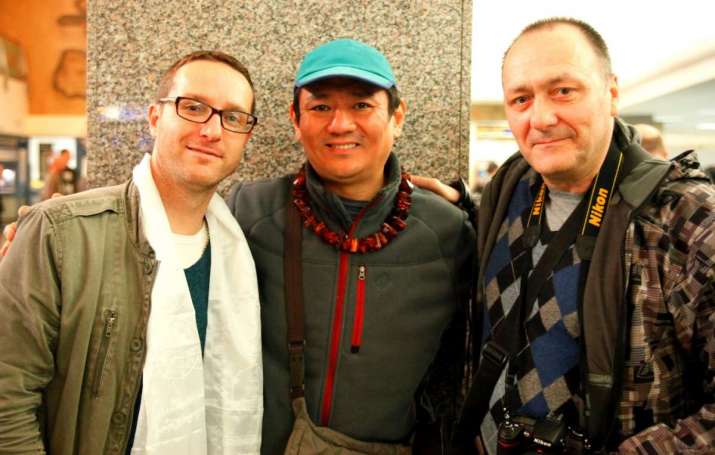 Yavor Konstantinov, Chogtrul Rinpoche, and Roman Stanoev. Image courtesy of Palyul Center Bulgaria
Yavor Konstantinov, Chogtrul Rinpoche, and Roman Stanoev. Image courtesy of Palyul Center BulgariaBuddhistdoor Global: What have been the main challenges during the COVID-19 pandemic for the most active Buddhist center in Bulgaria?
Javor Konstantinov: Throughout almost the whole of 2020, the center had to remain closed due to the pandemic. This meant stopping its activities and the regular program of practices, without clarity on when it could reopen. The issue of the financial survival of the center turned out to be of paramount importance in this new situation. We had to be flexible and choose a proper strategy to preserve this almost 10-year-old Dharma project.
BDG: How do you plan to maintain the center and move forward?
JK: Fortunately, the blessings of the buddhas and the lineage teachers, as well as the unity and enthusiasm of the Bulgarian Palyul sangha have helped us to move forward, despite the difficulties. We started online events and joined the virtual practices of other Palyul centers, mainly the German Palyul Center in Züsch. In 2020, we started the Buddhist almanac Lotus, which is published twice a year and has been a great success. As early as 2018, our root teacher Pema Rinpoche predicted that such an edition would be of great benefit to the center and to Bulgarians interested in Buddhism.
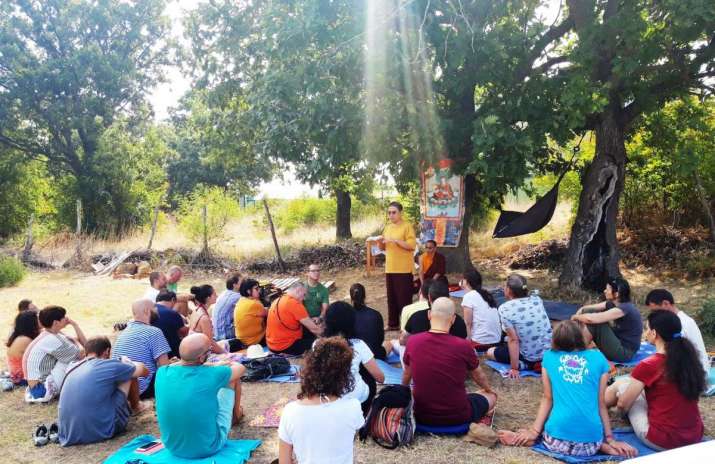 Summer retreat with Pema Rinpoche and Khenpo Dawa. Image courtesy of Palyul Center Bulgaria
Summer retreat with Pema Rinpoche and Khenpo Dawa. Image courtesy of Palyul Center BulgariaBDG: How has social distancing affected relationships in your sangha?
JK: We all miss practicing at the center, as well as the contact and direct communication between us. We make efforts to ensure that these relationships do not stop completely and we try to help each other when one of us is experiencing difficulties.
Roman Stanoev: Social distancing affects everyone. I rarely hear from some of the sangha's members. I try to phone them at least once a month and ask them how they are and if they have any problems. With close friends from the sangha, we talk almost every day and sometimes we meet in a park and drink coffee together.
BDG: Are you able to maintain contact with Palyul teachers and receive online teachings and guidance?
RS: Yes, it seems that the connection with them has become easier. Our teachers have accepted online communication and use social media more often. A series of online teachings and practices has started, and an online practice was held on the occasion of the parinirvana of Kyabje Thubten Palzang Rinpoche.* Even now, one of the senior Palyul teachers from the Ngagyur Nyingma Institute of Namdroling Monastery, Khenchen Pema Sherab Rinpoche, gives online teachings based on Nagarjuna’s text Letter to a Friend and the Bulgarian Palyul sangha is joining the program.
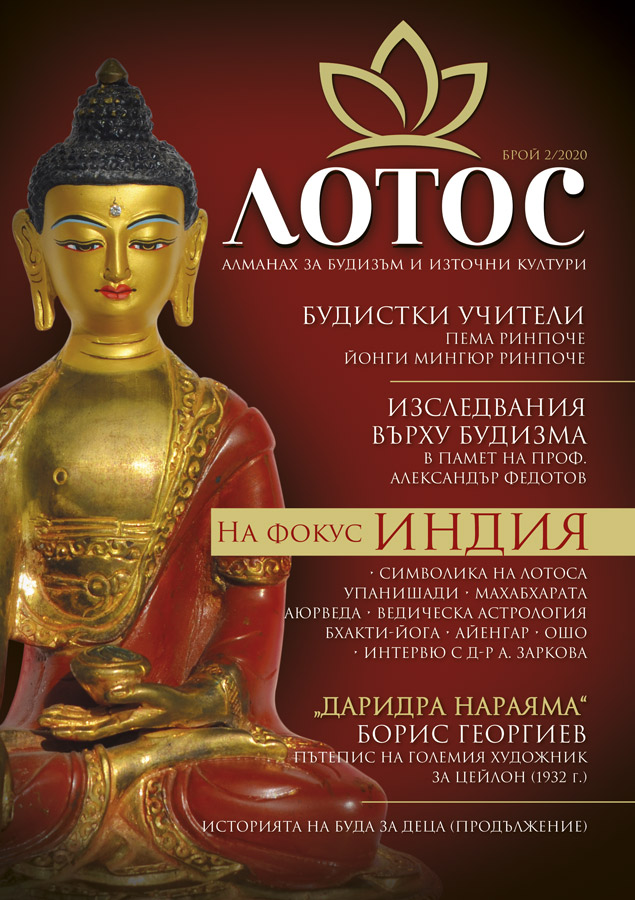
Buddhist almanac Lotus.
Image courtesy of Palyul Center Bulgaria
BDG: Have you found any positive changes in your Dharma practice during this difficult time for all mankind?
RS: The most positive change is that the Dharma has taken deeper root within me. Impermanence, precious human rebirth, equanimity, and compassion are so visible that you can’t help but see them, think about them, and apply these profound thoughts in everyday life.
JK: The Dharma teaches us that even in the most difficult moments there is a chance for renewal and awakening. Everything we thought was stable and permanent is now changing, falling apart. The pandemic has sent us into the retreat of impermanence.
* Palyul Monastery Announces the Parinirvana of Kyabje Thubten Palzang Rinpoche (Buddhistdoor Global)
See more
Palyul Center Bulgaria
Palyul Ling International
Related features from Buddhistdoor Global
The Flourishing of the Palyul Tradition in Bulgaria
Along the Path of the Buddha: Buddhism in Bulgaria
The Way of the Bodhisattva: A Tribute to Prof. Alexander Fedotoff
Related news from Buddhistdoor Global
National Gallery of Bulgaria Hosts Exhibition of Himalayan Buddhist Art
Nyari Tritul Rinpoche Gives Teachings in Bulgaria
Related blog posts from Buddhistdoor Tea House
The Teacher Who Dispels the Darkness of Ignorance and Brings the Light of Wisdom














